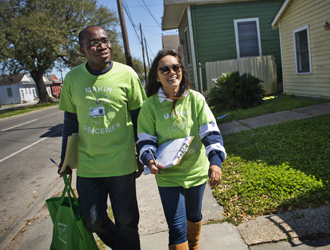Makin
This academic year, the Tulane Prevention Research Center has collected information in two New Orleans neighborhoods to see how residents shop and eat in areas that have limited availability of healthy food.

Tulane public health graduate students Omayemi Ofuya and Claire Wichitchu conduct door-to-door surveys to assess residents' eating and grocery-shopping habits in two New Orleans neighborhoods. (Photo by Paula Burch-Celentano)
The Prevention Research Center began the study in partnership with several New Orleans neighborhood groups, public health advocates, academic institutions, social entrepreneurs and local residents. The project is part of core research on food access, funded by the Centers for Disease Control and Prevention.
“This has been a collaborative process from the beginning the partnership designed the logo and helped decide what questions to ask residents,” says Jeanette Gustat, an associate professor of clinical epidemiology and faculty member leading the project.
The Makin' Groceries study revolves around an in-depth description of the grocery shopping and dietary patterns of residents living in two New Orleans neighborhoods with documented food access issues: the Bunny Friend neighborhood in the Upper Ninth Ward and the Treme/Lafitte/Mid-City area around North Broad Street.
The Makin' Groceries research team will look at how the food environments in the two neighborhoods are associated with healthy eating attitudes and practices.
“Once we collect and analyze the necessary data, we hope to share the results so that everyone, from residents to policymakers, can use the information to make decisions about addressing the lack of healthy foods in many neighborhoods,” Gustat says.
Students working on the study said they gained insights into food access issues by hearing firsthand accounts of how residents have to go to great lengths to even get to a store.
“It was sad to hear that many residents have had to go without eating fresh fruits and vegetables due to distance and cost,” says Claire Wichitchu, a student graduating this year.
Naomi King Englar is communications and training coordinator at the Tulane Prevention Research Center in the School of Public Health and Tropical Medicine.
